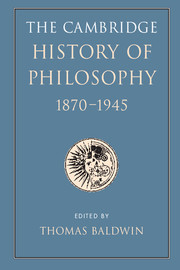Book contents
- Frontmatter
- Contents
- List of contributors
- Introduction
- I 1870–1914
- II 1914–1945
- 8 Logic and philosophy: the analytic programme
- 9 The diversity of philosophy
- 10 Knowledge, language, and the end of metaphysics
- 11 Philosophy and the exact sciences
- 12 Mind and its place in nature
- 13 Philosophy and social science
- 55 The methodology of the social sciences
- 56 The rise of social anthropology
- 57 Western marxism and ideology critique
- 14 Ethics, religion, and the arts
- 15 Law and politics
- Biobibliographical appendix
- Bibliography
- INDEX
- References
55 - The methodology of the social sciences
from 13 - Philosophy and social science
Published online by Cambridge University Press: 28 March 2008
- Frontmatter
- Contents
- List of contributors
- Introduction
- I 1870–1914
- II 1914–1945
- 8 Logic and philosophy: the analytic programme
- 9 The diversity of philosophy
- 10 Knowledge, language, and the end of metaphysics
- 11 Philosophy and the exact sciences
- 12 Mind and its place in nature
- 13 Philosophy and social science
- 55 The methodology of the social sciences
- 56 The rise of social anthropology
- 57 Western marxism and ideology critique
- 14 Ethics, religion, and the arts
- 15 Law and politics
- Biobibliographical appendix
- Bibliography
- INDEX
- References
Summary
As the social sciences began to come into their own in the early part of the twentieth century, the utility of the Neo-Kantian dualism between the human (Geisteswissenschaften) and the natural sciences (Naturwissenschaften) once again became controversial. Previously philosophers who were in favour of this distinction saw it as the only way to save the human sciences from the encroachment of the natural sciences, especially from positivism’s denial of the status of ‘science’ to enquiries that did not issue in prediction and control. Such dualism demanded strict separation, marked by ontological differences involving distinctive features of the objects of study, such as their particularity rather than generality, or epistemological differences between understanding and empirical observation. After 1915 the participants in the debate changed as it shifted away from a conception of human sciences modelled on history or textual interpretation towards a debate about the social sciences themselves, specifically sociology and its theories of social action. Even those philosophers who maintained weakened versions of dualism did so for a different purpose. Distinctions were now formulated in methodological terms and the issue became how to understand distinct explanatory and interpretive tasks within the social sciences themselves.
Once formulated in methodological rather than ontological or transcendental terms, the divide between the sciences no longer seemed to be an unbridgeable gap. The issue now became not whether or not there are different legitimate methodologies, but whether they can be brought together in some methodological unity or should be left as a heterogeneous plurality of unrelated approaches. Once the discussion of the social sciences included well-developed disciplines as diverse as economics, sociology, and history, the task of distinguishing the human from the natural sciences became less important than that of figuring out how such disciplines and the diverse approaches within each of them might be brought ‘under one roof ’, as Max Weber demanded for sociology.
- Type
- Chapter
- Information
- The Cambridge History of Philosophy 1870–1945 , pp. 667 - 678Publisher: Cambridge University PressPrint publication year: 2003



